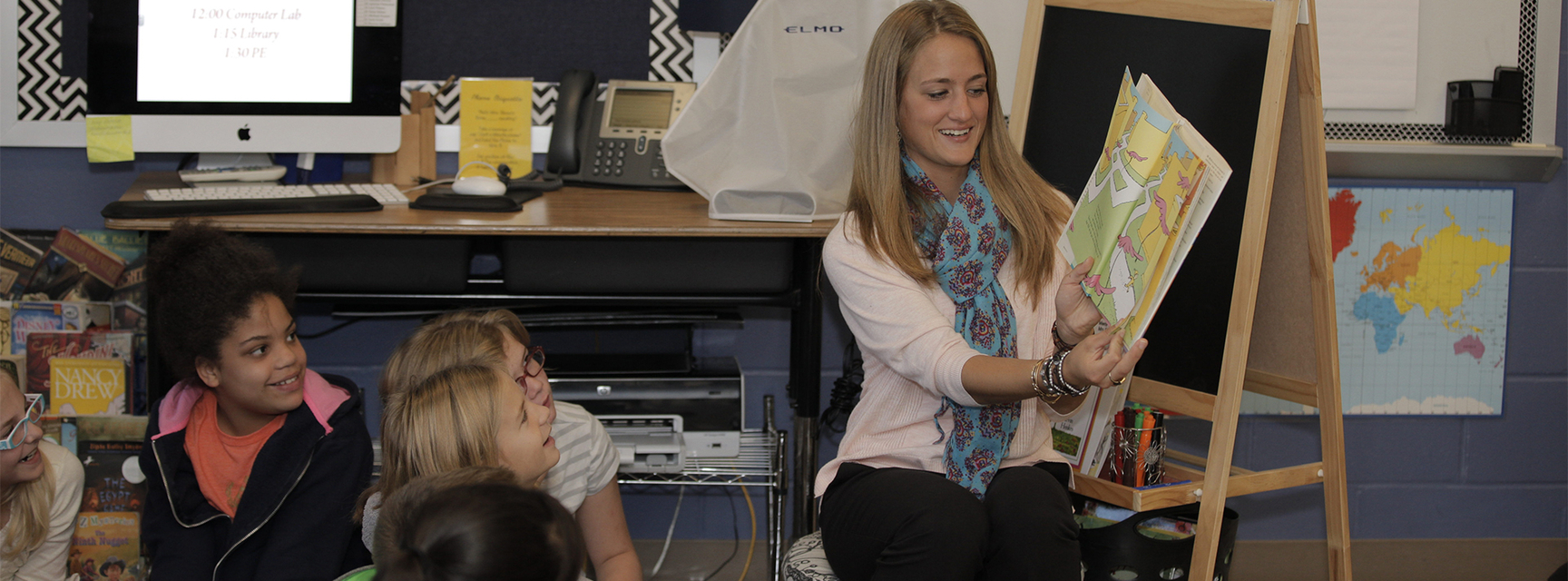Education Internship I
This course assists transfer students and students in PACE programs to complete a concentrated internship in a classroom with a certified teacher, develop the first Embedded Signature Assessment, and prepare their School of Education application materials so that they may be admitted. The internship comprises 40 or more hours in a Pre-K, elementary or secondary school classroom. Students must complete a reflective journal about their classroom experience and complete the ESA. The internship provides opportunities for students to learn about the role of teachers in their field, specific grade levels, and content areas and to gain experience with students. This course is required for all education majors. This course can be repeated. (ED170)
|
Education Internship II
A concentrated, week long internship in a classroom with a certified teacher. Students serve as an unpaid teacher's aide in elementary and/or secondary schools for 5 consecutive days. Students attend an orientation seminar and complete reflective journals about their experiences. This exploratory internship provides opportunity for students to learn about the role of teachers in their field. Repeatable. Available during spring semesters only. Students register for internships in January, March and/or May sessions when University is not in session. (ED172)
|
Human Development: Pre-K through 6th Grade
Study of child and adolescent development. Major theories of physical, intellectual, social, emotional and moral development are examined. Issues and concerns specific to elementary school students, such as emergent literacy, developing social competence, and the effects of poverty and negligence are addressed. Implications for instructions will focus on the needs of children in PreK through sixth grade. Pre-requisite: ED120/ED170. (ED200)
|
Literacy I: Children's Literature
This content and methods course reviews the broad body of children's literature available for teachers to use in K-8 classrooms. Emphasis is placed on exploring literature that teaches a diverse worldview and addresses a variety of contemporary and historical social issues. Methods of integrating children's literature into the curriculum are investigated. Pre-requisite: Successful completion of ED 120 and Sophomore Block, or consent of the department chair. Heavy Reading Warning (ED204)
|
Language Arts Methods
Current methods used in teaching and assessing language arts for elementary children. The course addresses national and state standards for teaching language arts with a focus on phonemic awareness, phonics, fluency, vocabulary, and comprehension in addition to literature, genres of writing, speaking, listening, viewing, and visually representing and the incorporation of handwriting, spelling, and grammar for children K-6. Concurrent enrollment in ED 203, ED 207, and ED 270. Prerequisite: A grade of "C" or higher in ED 120. (ED206)
|
Foundations of Bilingual Education
This course introduces students to a growing population of linguistically and culturally diverse students in U.S. schools and considerations in meeting their educational needs. As the field of bilingual /ESL education is introduced, we examine bilingual education within political, social, cultural, and historical contexts. This course is specifically designed to meet the requirements for students pursuing Bilingual or ESL approval/endorsement in the state of Illinois. Cross listed as IN251.
Prerequisite: none (ED209)
|
Math Methods
Overview of current national and state mathematics standards. Theoretical and practical strategies for teaching mathematics in elementary schools. Includes peer-teaching experiences. Pre-requisite: Successful completion of one math course above MA098. Concurrent enrollment in ED305, ED306, and ED310 required for Junior Block for Elementary Education. (ED312)
|
Learning Differences of K-12 Individuals with Mild to Moderate Educational Learning Needs
This course provides students with more in-depth information on the characteristics and learning differences of K-12 individuals with special needs. Background will be provided regarding how special education law defines mild to moderate learning needs. The educational setting for the majority of students with learning disabilities and mild disabilities is the general education classroom, and teaching these students becomes the responsibility of the general education teacher. This course will address strategies for the general education teacher to instruct students with learning disabilities and related mild disabilities. The designation of Mild Disabilities is cross-categorical and includes students from several categories of disabilities, including but not limited to learning disabilities, mental retardation, and social/emotional disturbances. This course will assist students in understanding the learning needs of this particular group of students, and provide them with an opportunity to teach a lesson to a student with special needs. (ED215)
|
Instructional Strategies for Individuals with Learning Disabilities in K-12 Classrooms
This course addresses the psychology of, the identification of and the methods of instruction for the exceptional child in K-12 classrooms. Students will discuss theory and skills to create and teach lessons that are varied to meet the individual learning needs of all students with learning disabilities in K-12 classrooms. Students will engage in various learning activities through which they will learn and implement teaching strategies designed to create multiple paths so that students of different learning needs experience equally appropriate ways to sustain learning. Students will also show evidence of differentiating instruction by varying content, process, and product in their units and lessons. This course is required for all teacher candidates seeking state licensure. (ED115)
|
Intro to Teaching Learners with Diverse Abilities in K-12 Classrooms
This course provides a foundational introduction to the lives of individuals with special needs. Special attention is paid to educating individuals with diverse abilities in K-12 classrooms and how their needs impact the individual and family. The course also provides the student with a knowledge base of designing instruction that supports and maximizes individual abilities and learning in relation to an Individualized Education Program. (ED220)
|
Language Development and Linguistics
This course introduces students to language development. Both monolingual and bilingual language development will be explored. Students will be introduced to theories of language development. As classroom considerations for language learning are explored student will learn elements of linguistics as well as special considerations for English language learners (ELLs.). Issues of assessment will be introduced as well as special considerations of language development for internationally adopted children. Pre-requisite: ED209. (ED238)
|
Health, Nutrition, and Welfare of Young Children
Addresses the early childhood educator's role in assuring child health and welfare. Emphasis is placed on best health practices including nutrition, hygiene and well child care. In addition, environmental risks to children and their caregivers will be illuminated. Early identification and support for families of children with special needs will be addressed. Community resources will be identifieda nd the appropriate application of such resources discussed Current issues regarding the health and safety of children will be topics that drive classroom discussion. Pre-requisite: ED120/ED170. (ED237)
|
Sophomore Block Clinical Internship
A focused semester-long internship in an elementary classroom as part of a field-based learning experience with co-requisite Elementary Sophomore Block courses. During this internship, students will connect theory to practice with weekly instructional assignments to complete within the internship. (ED270)
|
Access to General Curriculum and IEPs in the K-12 Classroom
This course prepares students to understand the development and implementation of IEPs and how IEP goals and objectives and service plans can be written to enable access to the general curriculum in K-12 classrooms. Students will understand that individualization of instruction is an important part of special education. Instruction and schoolwork are tailored to the needs of each child. This course will assist students in their understanding of how changes made, in class work or routines because of a child's disability, can assist in access and achievement. (ED301)
|
Methods and Materials in the Education of English Language Learners
This course prepares students for differentiated instruction for English language learners (ELLs) in U.S. schools. Students will be introduced to the Sheltered Instruction Observation Protocol (SIOP) Model for designing lessons. Students will also be introduced to elements of reading instruction for ELLs as well as standards and assessment. Considerations for ELLs will be discussed in regard to Response to Intervention (TrI) and qualifying for special education services. Prerequisite: admittance to the School of Education and completion of Sophomore Block course work. (ED304)
|
Literacy III: Teaching Methods for Reading
Current methods and materials used in teaching school children to read. Incorporates state and national standards for teaching reading. Includes diagnostic and remedial techniques. Concurrent enrollment required in ED 306, ED310, and ED 312 for Junior Block. Pre-requisite: Successful completion of Sophomore Block courses and internship, and admission to the School of Education (or consent of Director of the School of Education). (ED305)
|
Methods of Teaching and Assessing Science in Elementary
This is a course in the methods of teaching and assessing science in K-8 classrooms. Students plan and teach an inquiry lesson that is aligned with state and national standards and benchmarks. Emphasis is placed on developing a working knowledge of the nature and progress of science. For traditional students, concurrent enrollment is required in ED305, ED 312, ED370 internship and ED310 for Junior Block. Pre-requisite: Sophomore Block courses and admission to the School of Education (or consent of Director of the School of Education). (ED306)
|
Creating Communities of Learners
Addresses principles of individual and group motivation and communication, as well as strategies of management and discipline, that will assist students to create positive learning communities that foster positive social interaction, active engagement in learning, and self-motivation. Case descriptions and microteaching will assist candidates to solve classroom behavioral and motivation problems. Applications of discipline and learning theories will be examined to enable the development of proactive and preventive classroom management strategies. Students will prepare and present a discipline and management plan. Concurrent enrollment in ED 305, ED 306 and ED 312 required for Junior Block for Elementary Education program and ED 332, ED 336, ED 335 and ED339 for Early Childhood Education program. ED 310 required for Music Education. ED 310 and ED 321 required for Secondary Block for Secondary and K-12 programs Pre-requisite: Sophomore Block courses (Early Childhood and Elementary Education only) and admission to the School of Education (or consent of the Director of the School of Education). (ED310)
|
Physical Development and Health
This course fulfills a major requirement for elementary Education majors. Major goals for this course include instructing future teachers to integrate specific state standards of physical development and health in their curricular instruction within a classroom setting. (ED314)
|
General Secondary Methods and Assessment
Theories and techniques of teaching in secondary schools with specific emphasis on the planning, organizing, and presenting of learning experiences and assessment of student achievement. As part of the Secondary Block, students are assigned to a local middle or high school classroom to complete a 30 hour internship for two full mornings a week for four weeks. Pre-requisite: Admission to the School of Education (or consent of Director of the School of Education). (ED321)
|
Assessment of English Language Learners
This course introduces students to the role of assessment in early childhood and elementary education. Types of formal and informal assessment for classroom purposes will be discussed as well as standardized assessments at the school, district and state level. Assessment for English Language Learners (ELLs) will also be a focus of the course. Assessments for determining English language proficiency in the identification of ELLs will be an element of the course. Standard and nonstandard types of assessment will be explored for the purpose of informing planning and instruction for ELLs as well as program development. Discussion will focus on reducing bias and the need for linguistic and culturally relevant assessment for ELLs. Linguistic and cultural considerations will also be discussed in the identification of ELLs for special education. Prerequisites: ED 209. (ED325)
|
Teaching Language Arts and Social Studies in Early Childhood
This course includes the study of social studies and language arts in an early childhood education program (PreK-3rd grade). Building a solid foundation in social studies will promote the development of citizenship and cultural understanding in a democratic society. The development of a child's environment, community, and world will be emphasized in social studies curriculum development. Basic principles, techniques, and materials are emphasized for the emergent literacy classroom. The techniques and principles of the project approach will be used to illustrate multidisciplinary and interdisciplinary teaching of social studies and language arts. Pre-requisite: Admission to the School of Education. Concurrent enrollment required in ED 336, ED 335, and ED 339 (ED332)
|
Methods in Early Childhood Special Education
Examines the process of adapting learning goals to a child's individual special needs. Includes a discussion of therapeutic measures to address a child's development in language, social-emotional, motor and cognitive domains. Concurrent enrollment required in ED 310, ED 332, ED 335, ED 336 as part of Junior Block. Pre-requisite: Admission to School of Education and successful completion of Sophomore Block courses. (ED339)
|
Junior Block Internship
A focused semester-long internship in an elementary classroom; part of a field-based learning experience with co-requisite junior block courses. During this internship, students will connect theory to practice with weekly instructional assignments to complete within the internship. (ED370)
|
Diagnosis & Assessment of Exceptional Needs
The assessment of student performance is one of the most difficult and most important of all tasks performed by teachers and must be ongoing as well as proactive in nature. This course addresses the identification of learning goals and subsequently involves diagnosis of student needs, provision for effective instruction with feedback, and use of assessment results to improve teaching as well as learning. This course will provide candidates with the assessment tools necessary to enhance learning for diverse student populations. Documenting student performance and progress both for instructional and accountability purposes will be emphasized. Students will develop and use new assessment paradigms to enhance students’ learning, communicate with parents and students, and create change regarding views toward assessment. They will learn how to communicate assessment results to their learners. Students will also explore established and developing technologies as well as computer software programs that are used to enhance the assessment process and record keeping, such as Aims-Web and Diebels. This course will also address the area of response to Intervention and how RtI is being used to diagnose learners with exceptionalities. (ED408)
|
Instructional Analysis, Design and Assessment in Pre-Student Teaching
Students will apply, implement and reflect on principles of instructional design and assessment in classrooms. Students will plan, instruct and assess a unit of instruction at the student teaching site. Instructional approaches and assessment techniques for teaching in the classroom setting will be learned during a co-requisite 40 hour internship. (ED420)
|
Early Adolescents and Schools
Study of the development of early adolescents (ages 10-14). Required for Illinois Health endorsement. Builds on knowledge from ED 200 or 201, Human Development, and other psychological foundation courses. Focuses on the developmental characteristics and the needs of early adolescents. Includes the advisory role of the middle grade (5-8) teacher in providing guidance as well as in assessing, coordinating and referring students to health and social services. A 20-hour internship in a middle level (grades 5-8) classroom is required. (current Millikin students should take this course for 2 credits; MU alumni and students not matriculating from Millikin will need to take this course for 3 credits to fulfill state requirements and will be expected to complete an additional project to account for the added credit.) Pre-requisite: ED 200 or ED 201 (or concurrent enrollment) and Admission to the School of Education (or consent of Director of the School of Education). (ED440)
|
Middle School: Philosophies and Practices
This course is required for Illinois Health endorsement on elementary and/or secondary certificate and encompasses ideas and practices for prospective middle school teachers. This course focuses on middle school philosophy, curriculum, instruction, and assessment. It includes instructional methods for designing and teaching developmentally appropriate programs in middle schools. The course also builds on knowledge from educational foundations and methods courses. (Current Millikin students must take this course for 2 credits; students not matriculating from Millikin will take this course for 3 credits to fulfill state requirements and will be expected to complete an additional project to account for the added credits) Pre-requisites: ED 203 or ED 321 and admission to the School of Education (or consent of Director of the School of Education). (ED450)
|
Supervised Teaching: Elementary School
This final field experience is required of all teacher candidates for certification. It is the capstone course for the education major. This course is taken in its entirety off campus at the school where student teaching has been assigned. The teacher candidate is immersed in the life of a mentor teacher for 14 weeks. The course requires that the teacher candidate will co-teach with a classroom teacher for the time they are student teaching. The cooperating teacher will lead the planning for both participants in the beginning and then, that role will gradually be assumed by the teacher candidate. Teacher candidates wil utilize the seven strategies of co-teaching and will complete a teacher work sample demonstrating how they will affect student learning. This is done in conjunction with ED 488. Education Senior Seminar taken in tandem with student teaching. (ED476)
|
Supervised Clinical Experience in K-12
This field experience is required of all teacher candidates for the Special Education Endorsement in K-12 classrooms. This course is taken in its entirety off campus at the same school where student teaching is assigned, during the semester prior to student teaching. The course requires that the teacher candidate will co-teach with a special education resource teacher who works with a variety of general education classroom teachers, most likely of whom one will be the candidates cooperating teacher the following semester. Attendance at on campus seminars will also be expected. (ED479)
|
Education Senior Seminar
Problems of beginning teachers, including the job seeking process, certification, legal aspects of teaching and graduate school opportunities. Specific problems analysis by teaching major and for each teacher candidate. Meets four times during student teaching and on-the-block after student teaching. Taken concurrently with ED 474, ED 476, ED 477, ED 478 (student teaching). Pre-requisite: Admission to and retention in the School of Education and Admission to Student Teaching. (ED488)
|






